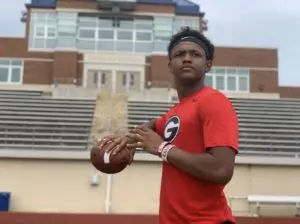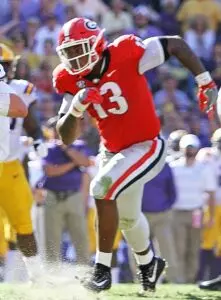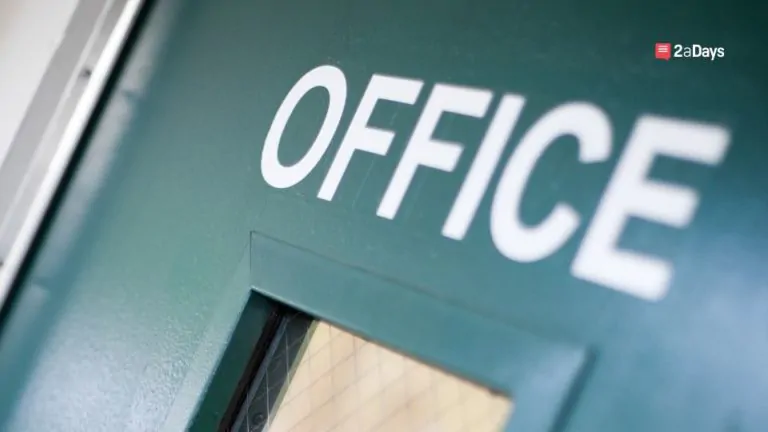Thirteen-year-old Jadyn Davis, an eighth-grader from Charlotte, North Carolina, recently received offers to play college football at both the University of Alabama and the University of Georgia. Davis attends Providence Day School and plays quarterback for his school's football team, the Chargers. His talent and six-foot, 155-pound size makes it no surprise that Davis caught the eyes of both James Coley, the Georgia quarterback coach, and Nick Saban, Alabama's head coach.
The Providence Day School Chargers play against other middle school teams in the Charlotte area in games comprised of eight-minute quarters. During the previous season, Davis completed 54 of 96 passes, for a 56.3% completion. Davis also had 716 passing yards with ten touchdowns along with five rushing touchdowns. Davis would often be benched or hand off the ball to prevent his team's score from climbing too high.
Davis received both of the offers after attending Alabama's and Georgia's football camps, where he demonstrated his skills and talents to curious eyes. Both Saban and Coley extended their offers to Davis quickly after his attendance in their camps.
Davis is not the only member of the Providence Day School Chargers to be contacted by college coaches. Cody Carter, another quarterback for the Chargers, received offers from Bucknell University, Furman University, Lehigh University, and Villanova University. Davis and Cody both compete for the starting quarterback position, but also motivate each other to improve. Adam Hastings, coach of the Chargers, speaks highly of both athletes.
“It is unusual, but college recruiting itself is an unusual animal today, so it's hard to explain,” Hastings said to Langston Wertz Jr. at The Charlotte Observer. “Four or five years ago, this was unheard of. We had a player here who received offers as an eighth-grader years ago (wide receiver Porter Rooks, now at Myers Park), and that was one of the first ones I'd heard about in this state for a really long time.”
Uncommon instances such as this are not unheard of. Wake Forest University gave an early offer to football player Chris Leak, who went on to be a significant contributor and leader for his football team. Leak received offers during his ninth-grade year.
Though playing football in college has always been a dream for Davis, recruiting at such an early age brings some controversy. Davis and his family have been considering keeping Davis in eighth grade for another year, allowing him to grow and develop his skills more before stepping onto the high school field.
“I worry that he and other thirteen-year-olds–who are being watched, graded, and packaged–will place everything in the basket of football,” Roger Barbee of The Sports Column said. “I also worry that they will repeat a middle-school grade to add another year of physical growth–not because it will help them academically.”
As recruiting continues to change over the years, so will the actions athletes and schools take to achieve their goals. Sports camps and recruiting outings allow collegiate-level coaches to spot talented athletes at an early age. Though this can allow athletes and coaches to work toward their goals more easily, it may be putting unnecessary stress on youth.
After sharing his offers via his Twitter account, Davis had to step away from his phone. Wertz also reported that Davis said, “My social media blew up as soon as I clicked the button on Twitter. It was pretty hectic. I had to turn my phone off for a little bit. I'm young and have a long way (to go) until I commit. I'm trying to stay as a kid. I've got to keep grinding and keep working.”
In the spring of 2019, the NCAA developed a rule aiming to prevent this early recruiting process. According to Michelle Brutlag Hosick's article “DI Council adopts rules to curb early recruiting. A student-athlete's college search will more closely align with that of the general student body under new rules adopted this week by the Division I Council.”
Though recruiting rules for football did not change this past spring, they were revised in recent years to help prevent early recruiting. According to the NCAA's recruiting guidelines, football coaches can have private correspondences with athletes on September 1 of the athlete's junior year, official visits on April 1, outgoing phone calls on April 15th, and off-campus contact on July 1st after an athlete's junior year.
By limiting early contact during the recruitment period, student-athletes are less likely to be stressed and are more likely to focus on the importance of athletic excellence and their academic responsibilities.
Edited by Caroline Kurdej
* Originally published on December 23, 2019, by Susan Guo







